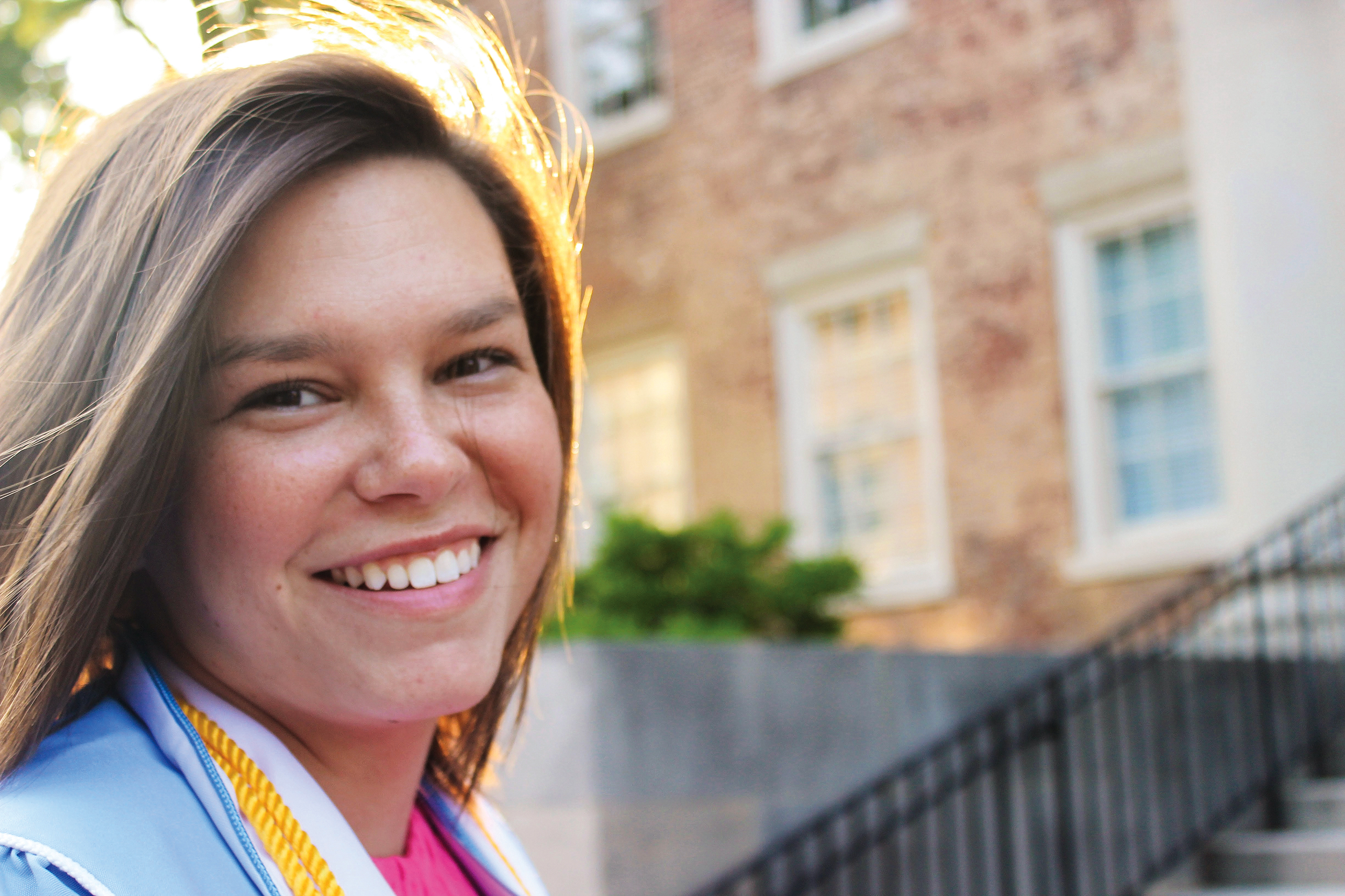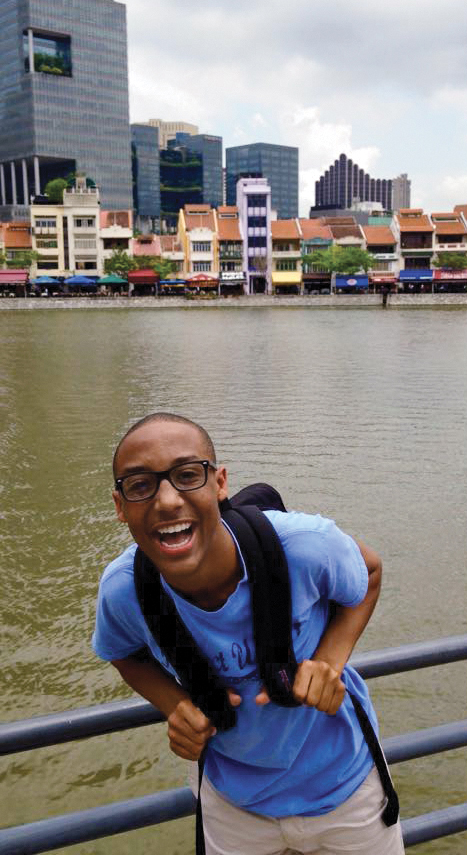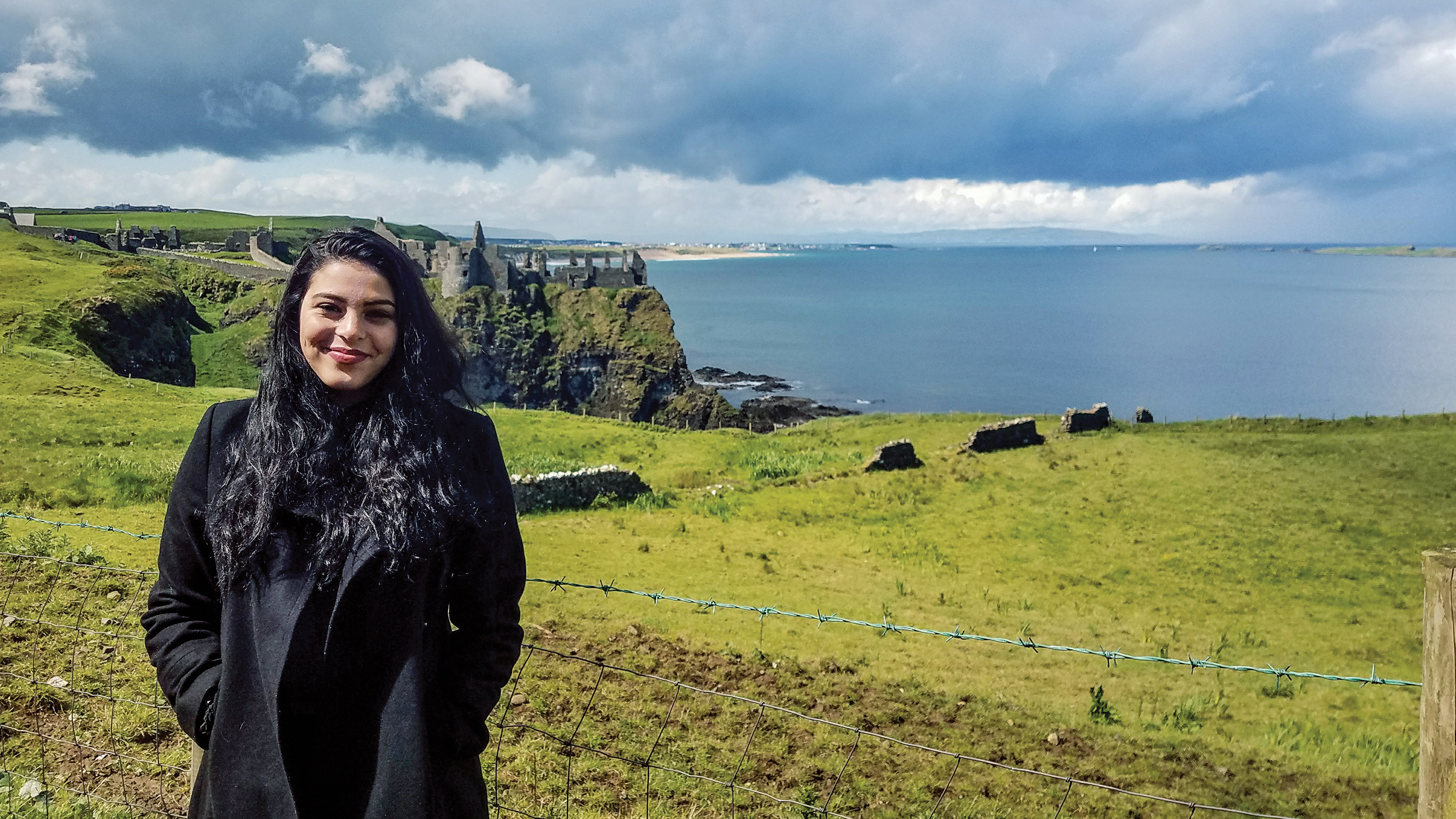A World of Opportunity
Posted on Nov. 12, 2018
CGI’s Global Take Off program is an “opening access” effort to expand global opportunities, especially to first-generation college students from lower income families, transfer students, minorities, veterans, athletes, students with disabilities and older students. (iStock photos)
Studying abroad is automatic for some students. For those of lesser means, it’s the opening of a portal they didn’t even know was there — and it can be a life-changing start to the college experience.
by Mark Derewicz
Hallie French ’17 sat on her bed, high school diploma in hand, muttering to herself: “Now what do I do?”
A smart, bookish kid from Aurora — a Beaufort County town with a population of 600 — French suffered so badly from test anxiety that she walked out of the SAT. Then she bombed the math portion of the community college entrance exam while weathering a terrible relationship she doesn’t like to talk about.
“I was lost,” she said. “So I took a year off and lived at home. I didn’t do anything. I definitely didn’t think I was Carolina material.”
A counselor convinced French to apply to the Carolina Student Transfer Excellence Program, and after three years at Craven Community College, French found herself in Chapel Hill.

A year after graduating from Carolina, Hallie French ’17 traveled alone to Europe on a Frances L. Phillips Travel Scholarship to study lesser-known writers, especially women and minorities. (Photo by Nicole Sari Vandiford ’18)
“I knew transfer students could struggle keeping their grades up, so I was terrified when I first got to campus. I feared pretty much everything, even public transportation.”
What turned her confidence around didn’t happen in Chapel Hill. UNC’s Center for Global Initiatives took her on a five-day trip to Puerto Rico, and paid for it, before she started her studies here.
CGI’s Global Take Off program is an “opening access” effort to expand global opportunities, especially to first-generation college students from lower income families, transfer students, minorities, veterans, athletes, students with disabilities and older students.
This simple faculty-led trip to an American territory altered French’s trajectory, not just as an English major at Carolina but as a human being.
Jamie Ramos, a senior in the School of Information and Library Sciences, comes from a broken home. Like a lot of Carolina students, she couldn’t dream of family financing for college — of which she had no prior understanding beyond just going to class.
“Oh my God, if it wasn’t for CGI I would never have gone abroad,” she said. “Someone could’ve handed me $10,000, and I still would never have gone. They’ve helped me figure out everything, working with me and my department a lot.”
CGI program manager Katie Costanza ’09 (’14 MPA) believes this kind of introspection is critical to the college experience.
“Students come back and tell me how their entire frame of reference has changed, how they rethink what they’re capable of,” she said. “Sometimes a trip can reframe their values. I’ve had students say they prioritize their time differently because they have a better understanding of what they care about, what excites and inspires them.”

Aaron Epps ’18 said traveling to Southeast Asia for two months in the summer after his sophomore year changed him. “I became so much more confident and independent.” (Photo courtesy of Aaron Epps ’18)
Aaron Epps ’18, an African- American and Native American from Robeson County, said traveling to Southeast Asia for two months in the summer after his sophomore year changed him. “I became so much more confident and independent,” he said. “One hundred percent, I became a better person.”
After his travel, Epps became vice president of his class and president of the Black Student Movement, working with black students on various issues, including what it’s like to be poor and black while traveling abroad.
Epps came back to campus and took on diversity issues, such as implicit biases related to race, gender and others. He helped create workshops for faculty, interned with Google’s diversity team last year, and now works in Microsoft’s diversity department as a college recruiter. UNC is part of his turf.
He said getting a passport through CGI and going abroad early in his college career laid the groundwork for everything that came after it.
Reaching the less traveled
Many Carolina students arrive on campus primed to take advantage of travel opportunities. Their families have money. They’ve already been abroad. They understand the inherent value of studying abroad and creating bonds and networks beyond UNC, North Carolina and the United States. This is one reason why traditional study abroad programs typically attract middle and upper-middle class white humanities students.
Carolina’s study abroad office tries to help students overcome financial and other hurdles, including with numerous scholarships. Jason Kinnear, interim director of UNC Study Abroad, said it awarded more than $930,000 in scholarships last year.
Faculty-Led Trips, and Funding to Help
In 2018, CGI received 369 applications for its three foundational opening access programs designed for students with financial need and limited travel experience. Of this applicant pool, 70 percent are students of color, 18 percent are students with disabilities, 49 percent are first-generation college students and 21 percent are transfer students.
• Global Take Off programs offer faculty-led, short-term global experiences to students with demonstrated financial need and limited to no travel experience. In the four years that Global Take Off: Puerto Rico has been in place, CGI has received 600 applications. Privately funded, the program has been able to send 48 students to the island territory.
• The Carolina Global Initiative Award provides funding to students to complete a global opportunity during the summer, in the U.S. or abroad. Since spring 2015, The CGI Award has sent 54 students from 25 disciplines to 35 countries to research, study, work and serve. Of those students, 30 are first-generation college students, 26 are first-generation global travelers and 37 are students of color.
• Passport to Go! provides funding for first-year or new transfer students to obtain their first U.S. passport.
“We helped fund more than 300 students last year, but we had 1,600 applications,” Kinnear said. Still, Study Abroad has been greatly expanded since 2000, when about 17 percent of undergraduates studied abroad for credit, most in England and Western Europe. In 2018, about 36 percent of undergrads studied abroad, and students now can choose from more than 400 programs in 71 countries. These numbers don’t include the Kenan-Flagler Business School, which sends 72 percent of its students abroad, typically for one- to two-week programs as part of their coursework.
Kinnear said his office is exploring similar options instead of relying solely on six-week or longer study abroad experiences during the summers or fall and spring semesters. “And we’re now reaching out across campus to collaborate with groups that work closely with students from diverse backgrounds.”
Still, Kinnear agreed with Niklaus Steiner ’88, director of CGI, that a lot of students are initially hesitant to consider study abroad for a variety of reasons, the top one being lack of money.
About 43 percent of Carolina’s student body receives financial aid. It isn’t feasible for many of these students to do traditional study abroad, which can cost thousands of dollars.
If they apply for study abroad, there’s no guarantee they’ll get financial help. If they do, Steiner said reimbursements or cash advances can sometimes be too slow for students with slim financial margins.
“I got my passport through CGI and would never have been able to travel without financial help,” Epps said. “In fact, I still struggled while I was there because I had no money to do the things other students did on weekends.”
Steiner, born in Switzerland and the son of a professor, had more international experience before he turned 18 than most Americans accrue in a lifetime. And now his daughters do.
“Look, my kids don’t need paid internships,” he said. “My daughter has taken two fabulous unpaid summer internships that will probably help her get a job. Other students simply cannot do that. They have to work to make money, and that money can’t be spent on traveling abroad.” So, do these students really have the same opportunities as others, such as, say, Steiner’s own kids?
There are cultural reasons some students don’t pursue global experiences.
Parents whose children are the first in the family to attend college might wonder: Why should their kids explore some strange and possibly “dangerous” country when even Chapel Hill provides such a culture shock? Transfer students and athletes often think they don’t have time to go abroad. Some students even lack the $135 for a passport or cash for application fees for global programs.
This is where CGI plays a critical role. It doesn’t replace traditional study abroad — it augments it and works with the Study Abroad Office, as well as other units on campus, to encourage students to consider working, researching or volunteering abroad.
“If you want to take classes in Spain for credit, you go to the Study Abroad Office,” Steiner said. “If you want to do a four-week internship or conduct research in Spain, or if you want to pursue an international project for a week or two, you come to CGI.
“Essentially, for everything not for credit, you come to us.”
“Much more open-minded”
For Hallie French, the small-town transfer who found her confidence in Chapel Hill, it started with observations.
“At first, Puerto Rico seemed so different from where I grew up — different language, different culture, different history,” she said. “But then I saw common threads. There’s coastal gentrification in Puerto Rico, same as here. Some communities seem forgotten in Puerto Rico. I know people in North Carolina who feel the same way.” She learned the history of Puerto Rico. She bonded with her fellow Carolina students and learned from strangers. She was most intrigued by traditional dance — not because she’s a dancer, but because she isn’t.
“I’m much more open-minded than I used to be. I’m much more apt to try to understand why people make the decisions they make. I’m less quick to judge. I feel like my eyes are open to things going on around the world and even in my own country.”
–Hallie French ’17
“I’m an introvert, so learning those dances was such a step outside my comfort zone and so immersive into a new culture.” Like she took a step outside herself. The trip started a curiosity about the world, about life, about herself.
“I’m much more open-minded than I used to be. I’m much more apt to try to understand why people make the decisions they make. I’m less quick to judge. I feel like my eyes are open to things going on around the world and even in my own country.”
The trip fueled her desire to serve others. In two years at Carolina, she did 300 hours of public service to become a Buckley Public Service Scholar. She was a peer-mentor for incoming transfer students and was a teacher and board member for Splash UNC, a service project that brings high school students from across the state to UNC to experience college life and academics. She worked at the Center for the Study of the American South and volunteered in the English department’s lab that focuses on health science and humanities projects to effect social change.
CGI helped French get a paid internship at a Durham-based magazine, Scalawag, before she decided to go back to her old stomping grounds, Pamlico County High School in Bayboro, to be a counselor for kids like her — high achievers from rural North Carolina who often don’t have the money to choose any university, let alone take a life-changing trip abroad.
This past summer — a year after graduating from Carolina — she traveled alone to Europe on a Frances L. Phillips Travel Scholarship to study lesser-known writers, especially women and minorities.
She has transformed from an emotionally paralyzed high school student frightened of standardized tests into an international traveler who graduated — with honors. That kind of transformation is not what CGI aims for, but its pragmatic mission of giving more students more global opportunities through federal grants and private donations makes such a story far from unique, Costanza said.

Jamie Ramos found a home at CGI, where she got a free passport. She crossed an ocean, visiting Europe for two weeks as part of the Berlin/Dublin Summer Seminar run by the School of Information and Library Science. (Photo courtesy of Jamie Ramos)
Crossing an ocean
World travel was not on the radar of Jamie Ramos, the library science student from a single-parent family.
When Ramos was 8, her father physically abused her and cheated on her mom, who swooped up her kids and moved away. For the next 10 years, they’d scrape by on her mother’s meager teaching salary. When Ramos was in high school, her mom took custody of her brother’s daughter. Ramos set her class schedule so she could take her niece to school and pick her up afterward.
“I had no social life, no time for anything but school work and my niece,” Ramos said. “When my niece and I would argue, my mom would say, ‘You know, she looks at you like you’re her mom, don’t you?’ ” Yes, Ramos knew. She was frustrated, wished things could be different, wished her family wasn’t so poor, wished she didn’t suffer with a kidney ailment that can still leave her huddled in pain.
To Ramos, college was her savior. “Failure was not an option. I did not want to live like the rest of my family lives.” But she was clueless about college. “I went to a huge high school where guidance counselors were overwhelmed and assumed students had a baseline knowledge about college. I knew nothing. No one in my family knew anything.”
Ramos applied to several colleges in North Carolina, including Carolina, which invited her to visit. When Ramos earned a Gates Scholarship, which meant the Bill & Melinda Gates Foundation would pay for her education — including graduate school — her mother would not allow her to waste so much money on what she considered lesser schools.
“I went to a huge high school where guidance counselors were overwhelmed and assumed students had a baseline knowledge about college. I knew nothing. No one in my family knew anything.”
–Jamie Ramos
Once in Chapel Hill, Ramos found a home at CGI, where she got a free passport. “But the thought of crossing an ocean blew my mind.”
She had grown up doubting what might be possible, thinking it was wrong to spend money on herself. She found herself saying, “I can’t do that, I can’t do that,” even as she was trying to become the first person in her family to graduate with a bachelor’s degree.
Ramos would cross an ocean, visiting Europe for two weeks as part of the Berlin/Dublin Summer Seminar run by the School of Information and Library Science. She also traveled to London.
“I fell in love with Berlin. We visited tech startups and accelerators. It’s such a global city. It’s diverse. It’s green. I mean, I’m an eco-nut, but they’ve gone green in ways I’ve never considered. It was an inspiring place.”
Back on campus, Ramos became a sponge, soaking up every opportunity Carolina had to offer.
“CGI opened up my eyes to what was possible. I learned that we undergraduates were supposed to do internships, which I didn’t even know existed.” This summer, she interned at FishWise, a nonprofit dedicated to sustainability, human rights and best practices related to the fishing industry. She was paid. And this fall, as part of the study abroad program, Ramos is in London for the semester, aiming to learn about American history from a different perspective and discovering new experiences to share with her family.
“Everything I do, I see as setting a path for my nieces back in Gastonia. Overcoming everything I had to overcome — well, this has got to be the hardest it will be. There are very few things I do for myself.”
When her nieces visit Carolina, they take photos down off a wall in Ramos’ bedroom, photos of Ramos in Berlin and Dublin and London and California. They ask a million questions. They show the photos to friends. In place of these photos on her wall are notes from her nieces.
“The independence that Carolina allows you to have, the respect that people at CGI and across campus have for students has been so important for me,” Ramos said. “I’ve always been the kid who doesn’t know anything. So to come here and be someone and to find something that’s been instrumental in my growth; the community and atmosphere at CGI and Carolina have just meant everything to me.”
Then Ramos paused. Her eyes welled up. “I was always someone who took into account my circumstances, my terrible background. Too often I let it all define me. But not anymore.”
Mark Derewicz is a communications manager for UNC Health Care and a freelance writer.
